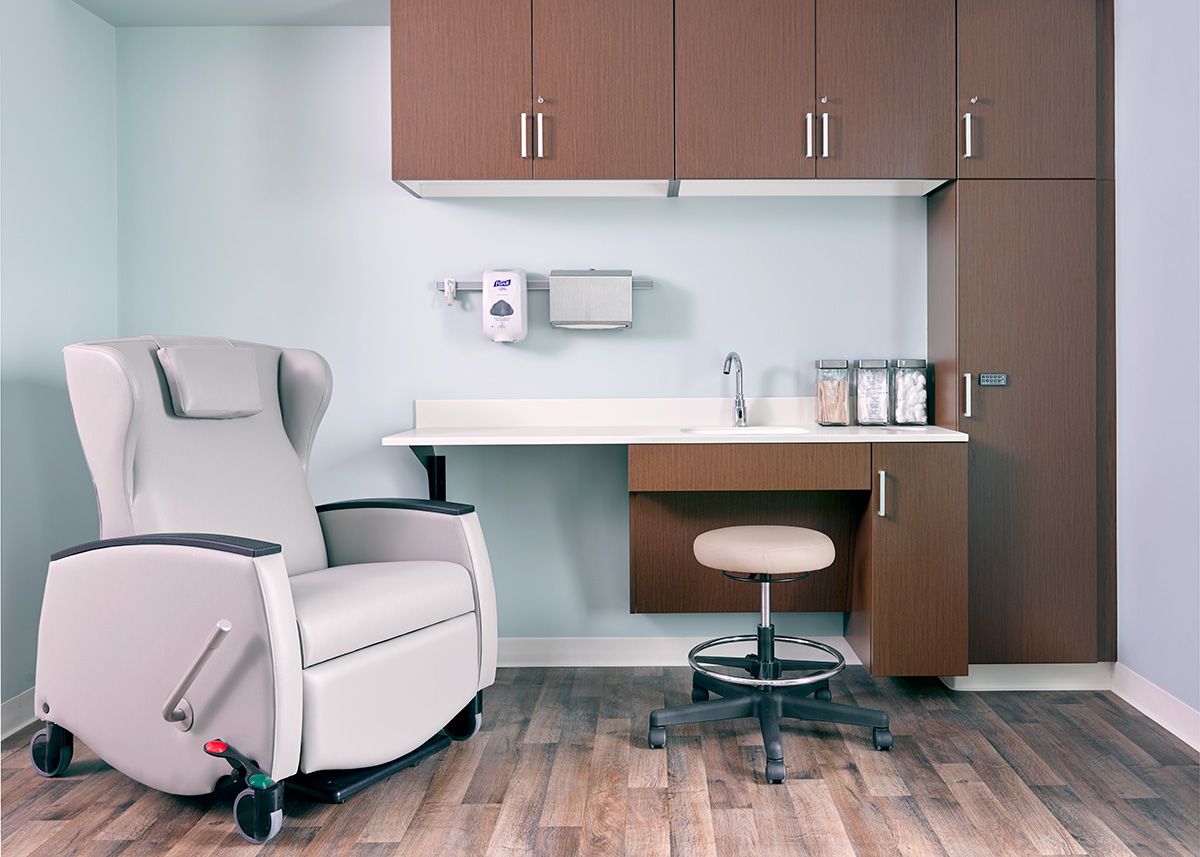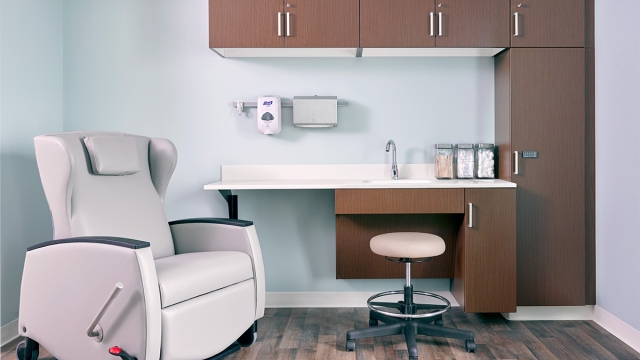Healthcare settings are constantly evolving to meet the diverse needs of patients and healthcare professionals. Design plays a crucial role in creating environments that promote well-being, comfort, and healing. From waiting rooms to patient rooms, the furniture used in these spaces plays a significant role in enhancing the overall experience. With innovative and stylish solutions, healthcare furniture is undergoing a revolution, providing not only functional attributes but also an aesthetic appeal that contributes to a positive atmosphere.
Gone are the days of traditional, plain and impersonal furniture in healthcare facilities. Today, designers are implementing thoughtful and ergonomic designs that prioritize patient comfort and safety, while also considering the needs of healthcare professionals. Modern healthcare furniture combines durability with sleek aesthetics, creating a welcoming ambiance that is both practical and visually appealing. As a result, patients can feel at ease during their stay, which can positively influence their healing process. Medical professionals can also benefit from well-designed furniture that supports their workflow and promotes efficiency.
In this article, we will explore the latest trends and innovations in healthcare furniture, highlighting the impact they have on the overall healthcare experience. From adjustable hospital beds to ergonomic seating solutions, we will delve into the importance of design in healthcare settings and how it contributes to improved patient outcomes. Join us as we unveil the stylish solutions that are revolutionizing healthcare furniture, ultimately transforming the way we view and experience healthcare environments.
Importance of Ergonomics in Healthcare Furniture
Ergonomics play a vital role in the design and functionality of healthcare furniture. When it comes to providing comfortable and supportive seating options for patients, healthcare facilities cannot overlook the importance of ergonomics. Healthcare furniture that is ergonomically designed ensures that patients receive the highest level of comfort and support during their stay.
One of the key benefits of incorporating ergonomics in healthcare furniture is the reduction of physical discomfort and the prevention of musculoskeletal disorders. Chairs and beds that are ergonomically designed are crafted to support the natural contours of the body, promoting proper posture and reducing the strain on muscles and joints. This not only enhances patient comfort but also helps in preventing the development of pressure sores and other discomforts associated with long periods of sitting or lying down.
Another important aspect of ergonomics in healthcare furniture is its impact on the well-being and overall experience of healthcare professionals. By implementing ergonomic designs in seating options for doctors, nurses, and other staff, healthcare facilities can greatly reduce the risk of work-related injuries and improve productivity. Ergonomically designed chairs and workstations allow healthcare professionals to maintain proper posture and reduce the strain on their bodies during long shifts, ultimately contributing to their overall well-being and job satisfaction.
Additionally, ergonomics in healthcare furniture contributes to creating a calming and welcoming environment for patients. When patients feel comfortable in their surroundings, it positively impacts their mental well-being and aids in the healing process. Ergonomic seating options, such as recliners or chairs with adjustable features, provide patients with the ability to personalize their comfort levels, promoting a sense of control and relaxation.
In conclusion, the importance of ergonomics in healthcare furniture cannot be overstated. From patient comfort and prevention of injuries to creating a soothing environment, ergonomic designs revolutionize the way healthcare furniture supports the well-being of both patients and healthcare professionals. By investing in ergonomically sound furniture, healthcare facilities can enhance the overall quality of care and create positive experiences for all those involved.
2. Innovations in Design and Technology
Healthcare furniture is undergoing exciting advancements in design and technology that are revolutionizing the way medical facilities and healthcare professionals operate. These innovations aim to enhance patient comfort, promote efficient workflows, and create a healing environment within healthcare settings.
Firstly, the integration of smart technology into healthcare furniture has opened up a realm of possibilities. Intelligent beds and chairs equipped with sensors and monitoring systems can collect vital health data continuously, ensuring that healthcare providers have real-time information about patients’ well-being. This technology enables early detection of potential issues and allows for prompt intervention, ultimately improving patient outcomes.
In addition to the integration of smart features, innovative design plays a crucial role in healthcare furniture. Gone are the days of cold and sterile hospital environments. Today, healthcare furniture is designed with a focus on aesthetics, creating a welcoming and calming atmosphere for both patients and caregivers. The use of warm colors, natural materials, and ergonomic designs not only enhances the visual appeal of healthcare spaces but also contributes to the healing process by reducing stress and anxiety.
Furthermore, modularity is gaining popularity in healthcare furniture design. Modular furniture systems allow for flexibility and adaptability, enabling spaces to be reconfigured quickly to meet changing needs. This approach is particularly beneficial in healthcare settings where the demand for space and functionality can vary. With modular furniture solutions, healthcare facilities can optimize their environments efficiently, promoting efficiency and cost-effectiveness.
In conclusion, the innovations in design and technology seen in healthcare furniture are transforming the healthcare industry in numerous ways. From smart features enhancing patient monitoring to aesthetically pleasing designs promoting healing environments, these advancements are redefining the standards of care. As technology continues to evolve, healthcare furniture will undoubtedly play a pivotal role in providing a comfortable and efficient experience for both patients and healthcare professionals.
3. The Future of Healthcare Furniture
In recent years, healthcare furniture has undergone significant advancements, paving the way for a more comfortable and efficient patient experience. As technology continues to evolve, so does the future of healthcare furniture.
One exciting development is the integration of smart features into healthcare furniture. Imagine a hospital bed that automatically adjusts to a patient’s preferred positions, providing optimal comfort and reducing the risk of pressure sores. Additionally, smart furniture can monitor vital signs and provide real-time data to healthcare professionals, allowing for more proactive and personalized care.
Another area of innovation is the use of eco-friendly materials in healthcare furniture design. With growing awareness of environmental impact, hospitals and healthcare facilities are striving to incorporate sustainable practices into their operations. Furniture made from recycled materials, such as reclaimed wood or recycled plastic, not only reduces waste but also creates a more healing and environmentally conscious space for patients.
Moreover, the future of healthcare furniture includes modular designs that can easily adapt to changing needs. Versatile and customizable furniture allows for efficient space utilization and quick reconfiguration to accommodate different treatment procedures. With modular furniture, healthcare facilities can optimize their layouts, promoting better workflow and enhancing the overall patient experience.
In conclusion, the future of healthcare furniture looks promising with advancements in smart features, eco-friendly materials, and modular design. These innovations aim to improve patient comfort, enhance efficiency, and create more sustainable healthcare environments. As technology continues to evolve and the importance of patient-centered care grows, we can expect to see further revolutionization in the realm of healthcare furniture.



















